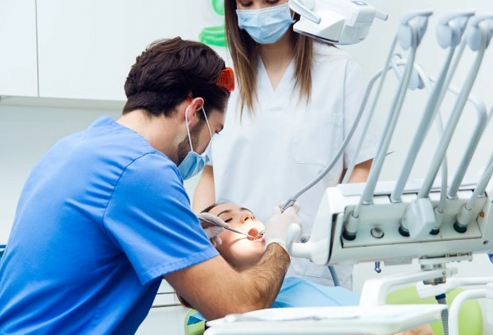
If you have had minor oral surgery, it is important that you follow your oral surgeon's instructions on how to care for the area after treatment so that your mouth can heal quickly and without problems. If in doubt, call your dentist or oral surgeon.
The following information serves as a general guideline. You should always follow the instructions given to you by your dentist.
It is generally advised to follow the below procedures prior to minor oral surgery:
Mobility
- Rest for at least two whole days and keep your head elevated.
- Call your doctor if the pain is not easing within forty-eight hours or if you feel, any complications have developed.
Bleeding
- Keep the gauze pad in your mouth over the wound for at least one hour no matter how soggy it gets; do not chew on the gauze pad or suck the affected area.
- Drink cool liquids only.
- Do not drink alcohol or smoke after the first two weeks of surgery as healing will be delayed.
Swelling
- If you experience swelling, apply a cold compress against your face to the affected area. Ice cubes wrapped in a towel or a bag of frozen vegetables also make good compresses; alternate the compress ten minutes on and ten minutes off.
- Do not apply heat to the affected area within twenty-four hours of surgery.
Jaw Soreness
- Gently massage your jaw muscles if they are not too sore with a warm, damp face cloth.
- Eat soft foods such as pasta, bananas and eggs.
- Drink cold drinks like milkshake, milk and juice.
- If your jaw is still sore and hard to open and it has been a week or more, call your dentist or oral surgeon.
- Do not force your mouth to open.
- Do not chew gum or eat hard or sticky food.
If you experience any of the following, call your oral surgeon or dentist immediately:
- Excessive bleeding four or more hours after surgery
- Nauseous or vomiting
- Fever
- Persistent pain one full day after surgery
- Swelling two or more days after surgery
Pain
You will be administered a local anesthetic that will freeze or numb the area of your mouth where the surgery is to take place. While your mouth is frozen, you should be careful not to bite your cheek, tongue or lip.
The numbness usually wear off within a few hours following the surgery, but it is normal to experience some pain after the anesthetic effects wear off. The level of discomfort you experience will depend on the surgery you underwent, as well as your body's ability to recover.
You are likely to experience the most pain for the first twenty-four to forty-eight hours following surgery. That is why it is best to rest during this time. As well, some soreness, tenderness or discomfort may remain for two days afterward around the actual location in your mouth where the surgery took place, which is very normal.
What to do:
- Talk to your dentist or oral surgeon. Whoever operated on you can prescribe medication to help you manage the pain, and an antibiotic to stop infection.
- Call your dentist or oral surgeon if the pain persists for a prolonged period, or worsens.
- Follow the advice of your dentist or oral surgeon, as well as your pharmacist when taking prescribed medication.
What not to do:
- Never take more medicine than prescribed.
- Never drink alcohol while taking medication.
- Never drive a vehicle or operate machinery if you are on medication that could cause drowsiness or alter your awareness in any way.


